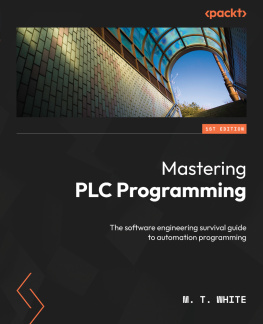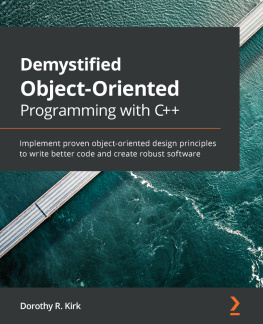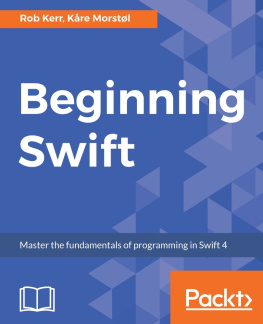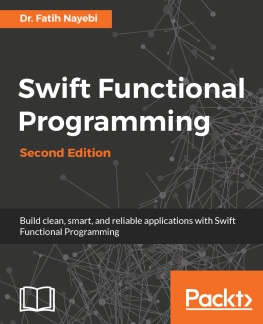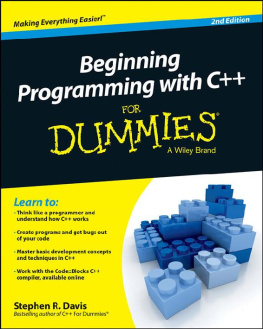About This eBook
ePUB is an open, industry-standard format for eBooks. However, support of ePUB and its many features varies across reading devices and applications. Use your device or app settings to customize the presentation to your liking. Settings that you can customize often include font, font size, single or double column, landscape or portrait mode, and figures that you can click or tap to enlarge. For additional information about the settings and features on your reading device or app, visit the device manufacturers Web site.
Many titles include programming code or configuration examples. To optimize the presentation of these elements, view the eBook in single-column, landscape mode and adjust the font size to the smallest setting. In addition to presenting code and configurations in the reflowable text format, we have included images of the code that mimic the presentation found in the print book; therefore, where the reflowable format may compromise the presentation of the code listing, you will see a Click here to view code image link. Click the link to view the print-fidelity code image. To return to the previous page viewed, click the Back button on your device or app.
Programming: Principles and Practice Using C++
Second Edition
Bjarne Stroustrup

Upper Saddle River, NJ Boston Indianapolis San Francisco
New York Toronto Montreal London Munich Paris Madrid
Capetown Sydney Tokyo Singapore Mexico City
Many of the designations used by manufacturers and sellers to distinguish their products are claimed as trademarks. Where those designations appear in this book, and the publisher was aware of a trademark claim, the designations have been printed with initial capital letters or in all capitals.
A complete list of photo sources and credits appears on pages .
The author and publisher have taken care in the preparation of this book, but make no expressed or implied warranty of any kind and assume no responsibility for errors or omissions. No liability is assumed for incidental or consequential damages in connection with or arising out of the use of the information or programs contained herein.
For information about buying this title in bulk quantities, or for special sales opportunities (which may include electronic versions; custom cover designs; and content particular to your business, training goals, marketing focus, or branding interests), please contact our corporate sales department at or (800) 382-3419.
For government sales inquiries, please contact .
For questions about sales outside the United States, please contact .
Visit us on the Web: informit.com/aw
Library of Congress Cataloging-in-Publication Data
Stroustrup, Bjarne, author.
Programming : principles and practice using C++ / Bjarne Stroustrup. Second edition.
pages cm
Includes bibliographical references and index.
ISBN 978-0-321-99278-9 (pbk. : alk. paper)
1. C++ (Computer program language) I. Title.
QA76.73.C153S82 2014
005.13'3dc23
2014004197
Copyright 2014 Pearson Education, Inc.
All rights reserved. Printed in the United States of America. This publication is protected by copyright, and permission must be obtained from the publisher prior to any prohibited reproduction, storage in a retrieval system, or transmission in any form or by any means, electronic, mechanical, photocopying, recording, or likewise. To obtain permission to use material from this work, please submit a written request to Pearson Education, Inc., Permissions Department, One Lake Street, Upper Saddle River, New Jersey 07458, or you may fax your request to (201) 236-3290.
ISBN-13: 978-0-321-99278-9
ISBN-10: 0-321-99278-4
Text printed in the United States on recycled paper at RR Donnelley in Crawfordsville, Indiana.
First printing, May 2014
Contents
Preface
Damn the torpedoes! Full speed ahead.
Admiral Farragut
Programming is the art of expressing solutions to problems so that a computer can execute those solutions. Much of the effort in programming is spent finding and refining solutions. Often, a problem is only fully understood through the process of programming a solution for it.
This book is for someone who has never programmed before but is willing to work hard to learn. It helps you understand the principles and acquire the practical skills of programming using the C++ programming language. My aim is for you to gain sufficient knowledge and experience to perform simple useful programming tasks using the best up-to-date techniques. How long will that take? As part of a first-year university course, you can work through this book in a semester (assuming that you have a workload of four courses of average difficulty). If you work by yourself, dont expect to spend less time than that (maybe 15 hours a week for 14 weeks).
Three months may seem a long time, but theres a lot to learn and youll be writing your first simple programs after about an hour. Also, all learning is gradual: each chapter introduces new useful concepts and illustrates them with examples inspired by real-world uses. Your ability to express ideas in code getting a computer to do what you want it to do gradually and steadily increases as you go along. I never say, Learn a months worth of theory and then see if you can use it.
Why would you want to program? Our civilization runs on software. Without understanding software you are reduced to believing in magic and will be locked out of many of the most interesting, profitable, and socially useful technical fields of work. When I talk about programming, I think of the whole spectrum of computer programs from personal computer applications with GUIs (graphical user interfaces), through engineering calculations and embedded systems control applications (such as digital cameras, cars, and cell phones), to text manipulation applications as found in many humanities and business applications. Like mathematics, programming when done well is a valuable intellectual exercise that sharpens our ability to think. However, thanks to feedback from the computer, programming is more concrete than most forms of math, and therefore accessible to more people. It is a way to reach out and change the world ideally for the better. Finally, programming can be great fun.
Why C++? You cant learn to program without a programming language, and C++ directly supports the key concepts and techniques used in real-world software. C++ is one of the most widely used programming languages, found in an unsurpassed range of application areas. You find C++ applications everywhere from the bottom of the oceans to the surface of Mars. C++ is precisely and comprehensively defined by a nonproprietary international standard. Quality and/or free implementations are available on every kind of computer. Most of the programming concepts that you will learn using C++ can be used directly in other languages, such as C, C#, Fortran, and Java. Finally, I simply like C++ as a language for writing elegant and efficient code.
This is not the easiest book on beginning programming; it is not meant to be. I just aim for it to be the easiest book from which you can learn the basics of real-world programming. Thats quite an ambitious goal because much modern software relies on techniques considered advanced just a few years ago.
My fundamental assumption is that you want to write programs for the use of others, and to do so responsibly, providing a decent level of system quality; that is, I assume that you want to achieve a level of professionalism. Consequently, I chose the topics for this book to cover what is needed to get started with real-world programming, not just what is easy to teach and learn. If you need a technique to get basic work done right, I describe it, demonstrate concepts and language facilities needed to support the technique, provide exercises for it, and expect you to work on those exercises. If you just want to understand toy programs, you can get along with far less than I present. On the other hand, I wont waste your time with material of marginal practical importance. If an idea is explained here, its because youll almost certainly need it.


